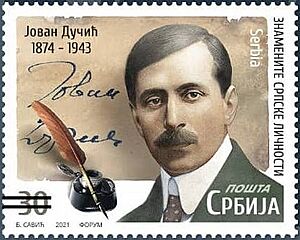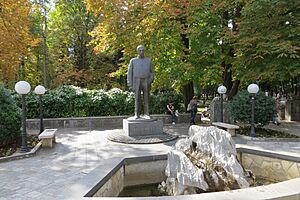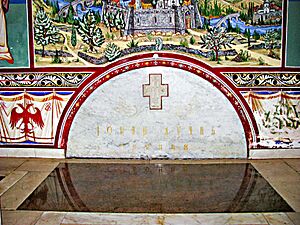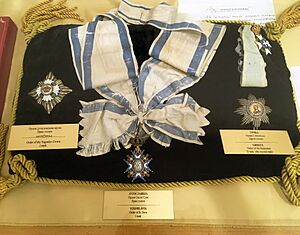Jovan Dučić facts for kids
Quick facts for kids
Jovan Dučić
|
|
|---|---|
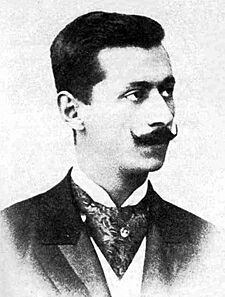 |
|
| Born | 15 February 1872 Trebinje, Bosnia Vilayet, Ottoman Empire (now Bosnia and Herzegovina) |
| Died | 7 April 1943 (aged 72) Gary, Indiana, U.S. |
| Resting place | Hercegovačka Gračanica monastery (since 2000) |
| Occupation | Poet, writer and diplomat |
| Nationality | Serbian |
| Alma mater | University of Geneva |
Jovan Dučić (Serbian Cyrillic: Јован Дучић, pronounced [jǒʋan dûtʃitɕ]; 15 February 1872 – 7 April 1943) was an important Serbian poet-diplomat and a member of the Serbian Royal Academy. He is known as one of the most influential Serbian lyric and modernist poets.
Dučić published his first collection of poems in Mostar in 1901. His second book of poetry came out in Belgrade in 1908. Besides poetry, he also wrote a lot of prose. This included many literary essays, studies about other writers, and letters from poets he met in Switzerland, Greece, and Spain. One of his most famous books is Blago cara Radovana (Tsar Radovan's Treasure).
He was also one of the people who started the Narodna Odbrana, a nationalist group in the Kingdom of Serbia.
Contents
About Jovan Dučić
Early Life and Education
Jovan Dučić was born on 17 February 1871 in Trebinje. At that time, Trebinje was part of the Ottoman Empire. He went to primary school in his hometown. Later, he attended high school in Mostar and trained to become a teacher in Sombor.
He worked as a teacher in several towns. Eventually, he returned to Mostar. There, he helped start a literary magazine called Zora (meaning Dawn). He worked on this magazine with other famous writers like Svetozar Ćorović and Aleksa Šantić.
Becoming a Diplomat
Dučić's strong Serbian patriotism caused problems with the authorities. At that time, Bosnia and Herzegovina was controlled by the Austro-Hungarian Empire. Because of these difficulties, he moved abroad to continue his studies. He studied mostly in Geneva, Switzerland, and in Paris, France.
He earned a law degree from the University of Geneva. After finishing his studies, he joined the Serbian diplomatic service in 1907. Even though he had once been against the idea of creating a country called Yugoslavia, he became the new country's first ambassador to Romania in 1937.
He had a very successful career as a diplomat. He worked in many important cities around the world. These included Istanbul, Sofia, Rome, Athens, Cairo, Madrid, and Lisbon. Dučić could speak several foreign languages. He also wrote interesting travel stories based on his time in these places. These stories were published in his book Cities and Chimeras. For example, he wrote about his time in Egypt, where he was the first diplomat for the Kingdom of Serbs, Croats and Slovenes.
His Poetry and Writing Style
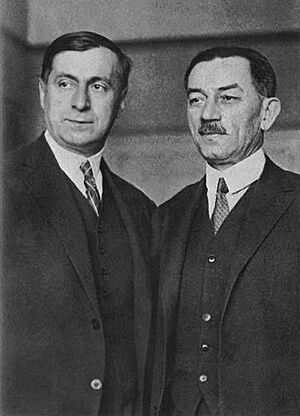
Jovan Dučić is most famous for his poetry. He published his first poetry book in Mostar in 1901. His second book of poems came out in Belgrade in 1908. He also wrote a lot of prose, which means writing that is not poetry. This included essays and studies about other writers. His book Blago cara Radovana (Tsar Radovan's Treasure) is very well-known. He also wrote "poetry letters" from countries like Switzerland, Greece, and Spain.
At first, Dučić's poems were similar to those of Vojislav Ilić, a leading Serbian poet from the late 1800s. But his travels abroad helped him develop his own unique style. He was greatly influenced by the Symbolist movement in art and literature. In his poems, he explored new ideas and themes that were not common in Serbian poetry before.
He focused on two main types of verse, both from France. He wanted to make sure his work had deep symbolic meaning. He was careful to avoid simple or common ideas and expressions in his writing.
Personal Life and Connections
In 1893, Dučić met Magdalena Živanović in Bijeljina. They became engaged on 5 November 1893. They continued to write letters to each other even after Dučić moved to Mostar to teach. Some of their letters are still kept today.
A professor named Ljiljana Lukić has copies of the letters between Dučić and Magdalena. She says that Magdalena lived by her memories of Dučić after they broke up. On Magdalena's grave in Bijeljina, it says: "Maga Nikolić-Živanović, 1874–1957, the poet herself and first inspiration of poet Jovan Dučić."
Years later, when Dučić was a minister for the Kingdom of Yugoslavia, a singing group in Bijeljina asked him for help. They wanted to build a home for their society. This shows how much of an impact Dučić had left in Bijeljina.
The Embassy of Serbia in Hungary is located in a house that Jovan Dučić received from a Hungarian woman. He then gave this house to the Serbian state.
Later Years and Legacy
In 1941, after Germany invaded and occupied Yugoslavia during World War II, Dučić went to live in the United States. He joined his relative Mihajlo (Michael) in Gary, Indiana. For the next two years, he led a group in Chicago called the Serbian National Defense Council. This group represented Serbs living in the U.S.
During this time, he wrote many poems, history books, and newspaper articles. He spoke out for Serbian causes and protested against the terrible violence and persecution of Serbs during the war. After World War II, his works were not included in school books in Yugoslavia for a while.
Jovan Dučić passed away on 7 April 1943. His funeral was held at the Saint Sava Serbian Orthodox Church in Gary, Indiana. He was buried in the Saint Sava Serbian Orthodox Monastery cemetery in Libertyville, Illinois.
In his will, he wished to be buried in his hometown of Trebinje. This wish came true on 22 October 2000. He was reburied in the newly built Hercegovačka Gračanica monastery in Trebinje.
His book Acta Diplomatica (Diplomatic Letters) was published after he died. It came out in the United States in 1952 and in Yugoslavia in 1991.
Today, the Jovan Dučić Award is given for achievements in poetry. It is awarded every year during an event called "Dučić's Night" in Trebinje. He was also chosen as a member of the Parnassos Literary Society.
Awards and Honors
Jovan Dučić received many honors and awards for his work and service:
- Member of Serbian Academy of Sciences and Arts
- Order of St. Sava, First Class, Kingdom of Yugoslavia
- Order of the Yugoslav Crown, First Rank, Kingdom of Yugoslavia
- Order of the Redeemer, Second Rank, Greece
- Order of the Nile, Grand Officer Rank, Egypt
- Order of the Crown of Italy, Broad Sash Rank, Kingdom of Italy
- Order of the Star of Romania, First Rank, Kingdom of Romania
- Order of the White Lion, Commander Cross Rank, Czechoslovakia
- Order of Merit of the Kingdom of Hungary, Grand Cross Rank, Kingdom of Hungary
Main Works
Here are some of Jovan Dučić's important published works:
- Pjesme, knjiga prva (Poems, Book One), 1901.
- Pesme (Poems), 1908.
- Pesme u prozi, Plave legende (Poems in Prose, Blue Legends), 1908.
- Sabrana dela (Collected Works), I-V, 1929-1930. This collection included:
- Pesme sunca (Poems of the Sun)
- Pesme ljubavi i smrti (Poems of Love and Death)
- Carski soneti (Imperial Sonnets)
- Plave legende (Blue Legends)
- Gradovi i himere (Cities and Chimeras)
- Blago cara Radovana: knjiga o sudbini (Tsar Radovan's Treasure: A Book on Destiny), 1932.
- Gradovi i himere (Cities and Chimeras), 1940.
- Federalizam ili centralizam: Istina o “spornom pitanju“ u bivšoj Jugoslaviji (Federalism or Centralism: The Truth about the "Disputed Question" in Former Yugoslavia), 1942.
- Jugoslovenska ideologija: istina o “jugoslavizmu“ (Yugoslav Ideology: The Truth about "Yugoslavism"), 1942.
- Lirika (Lyrics), 1943.
- Jedan Srbin diplomat na dvoru Petra Velikog i Katarine I – Grof Sava Vladislavić – Raguzinski (A Serbian Diplomat at the Court of Peter the Great and Catherine I – Count Sava Vladislavić – Raguzinski), 1943.


